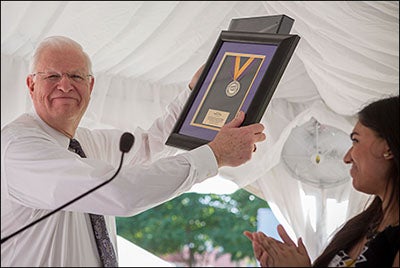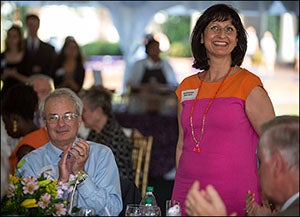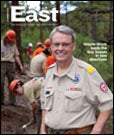‘GREAT GRACE, GREAT PASSION’
ECU Honors College bids farewell to transformative leader
 Dr. Richard R. Eakin, former chancellor and outgoing interim dean of the Honors College at ECU, expected he would be recognized somehow at a May 31 gala honoring the Polaris Society – an organization for friends of and donors to the Honors College.
Dr. Richard R. Eakin, former chancellor and outgoing interim dean of the Honors College at ECU, expected he would be recognized somehow at a May 31 gala honoring the Polaris Society – an organization for friends of and donors to the Honors College.
However, he wasn’t aware he’d be presented with the first-ever Honors College medallion, to be worn next May at graduation by the inaugural class of ECU Honors College students. And he surely didn’t know a new fund would be named in his honor: The Richard R. and Jo Ann Eakin Dean’s Priority Fund.

Honors College student and EC Scholar Shayna Mooney presents the first Honors College medallion to retiring interim dean Richard Eakin. (Photos by Cliff Hollis)
The endowment will benefit enhanced living and learning experiences for Honors College students as well as undergraduate research opportunities, said Kay Chalk, chair of the Honors College Advancement Council.
She and fellow council members raised $70,000 in two months to establish the fund, and The Bate Foundation pledged a $30,000 donation at the Polaris Society ceremony to round out the endowment.
Attendees rose to their feet and applauded the generous gift. Eakin beamed behind the podium.
“These young people are just fantastic,” he said, looking warmly at the dozen honors students gathered around him. “I have the very best job at ECU. We’ve had to chance to build something new and exciting, and the innovations are still coming on.”
Eakin will retire for the third time on June 30, capping 26 years of service to East Carolina University. He retired as chancellor in 2001, but a year later he returned to the classroom. He came out of retirement a second time in 2011 when he accepted the challenge of transforming ECU’s budding Honors Program into a full-blown college.
He may be back again. “The truth of the matter is I am a horrible retiree,” he said. “You only need ask my wife. I’m guessing that three weeks into this retirement she will say ‘can’t you find something to do to stop moping around the house?’”
Eakin, 74, said he and Jo Ann plan to continue living in Greenville. “This is a lovely community and a great place to live, so this is home.” He said he will devote much of his free time now to Greenville’s new GO-Science Center, where he chairs the board of directors.
Eakin says he most appreciates being called a teacher. “I always considered myself a teacher,” the former chancellor said. “Everything I do, including this job (running the Honors College), I try to be a teacher to my colleagues and students. I just think that’s a really important role for anybody to have.”
Eakin had served as chancellor nearly 15 years when he stepped down in 2001. His said his proudest moment as chancellor was in 1996 when the Carnegie Foundation reclassified ECU as a doctoral degree-granting institution. “Today we sort of take that for granted, but when we did that, the way the state of North Carolina funds its universities, it immediately resulted in a substantial increase in our financial resources. That allowed us to build on our doctoral programs and shore up other graduate programs.”
He led the planning for the campus building boom funded by the state higher education bonds in 1999, efforts that resulted in the Sci-Tech Building, the Student Rec Center and a major expansion of Joyner Library.

Dr. Marianna Walker, associate professor in the Department of Communication Sciences and Disorders, and former chair of the Faculty Senate, will replace Eakin as dean of the Honors College.
On the night the bond referendum passed, Eakin and a group of library supporters staged an impromptu groundbreaking at midnight. “All those people showing up in the middle of the night to break ground — that was one of the most delightful experiences I had as chancellor,” he said.
A year after stepping down in 2001, he returned to campus to teach higher education administration in the College of Education. After five years in that position, he served for a year as interim chair of the Department of Mathematics. He took a year off but returned to campus in 2011 as interim dean of the then-new Honors College.
“In late 2010 the Honors College was in its infancy and experiencing a bit of a rocky start,” Chancellor Steve Ballard wrote in an address read at the Polaris Society event. “It needed a calm hand from a trusted, seasoned leader – the kind of presence that only Dr. Eakin could bring.
“When asked to take on this important work, he did what he always does…with great grace and great passion he stepped right in and restored our confidence that ECU could and would build one of the best Honors Colleges in the nation. I believe we are well on our way to that goal.”
Raising the status of the Honors College also raised academic standards across campus, Eakin said. “We have all these honors students at ECU now, and you sprinkle those around the undergraduate classes and you have something special,” he said. “I am a proponent of the idea that if you’re teaching a class and you have one of these exceptional students in class, it raises the tenor of the whole conversation in that class. The whole level of performance by all students in that class increases by their presence.”

Read more about Eakin’s retirement and the Honors College in Summer 2013 issue of East magazine.
Eakin was just 49 when he came to ECU from Bowling Green State University in Ohio. He had spent 23 years at Bowling Green, rising from math professor to vice president. He received his undergraduate degree from Geneva College in Pennsylvania and his graduate degrees from Washington State University.
Under Eakin’s leadership, ECU completed its first major capital campaign, Shared Visions, which brought in $55 million. Enrollment swelled from 15,900 to 19,400 during his tenure. In 1998 he shocked many people by predicting that enrollment would grow to 27,000 within a decade. His prediction was wrong by about 600 students – on the low side.
While he was chancellor, he and Mrs. Eakin often were seen walking their dog and strolling the campus in the evenings. He said it was then that they came up with many ideas for campus beautification projects. “She and I would go out on the evenings and walk the campus and she would continually point out to me things that she thought could be improved. I knew we had to do something to dress up our curb appeal, so I decided to appoint a committee to see what could be done. They came up with some terrific ideas.”
He also led the restoration of campus after hurricanes Floyd and Fran.
Eakin attributes his success to the people around him. “I think that one of the most important things any educational leader needs is an incredible cast of associates who are as fine as they can be in their particular jobs. I was blessed with that at Bowling Green and here at ECU. They all have been at the top of their game, and when you have that, then it becomes much easier to move forward and do things of consequence.”